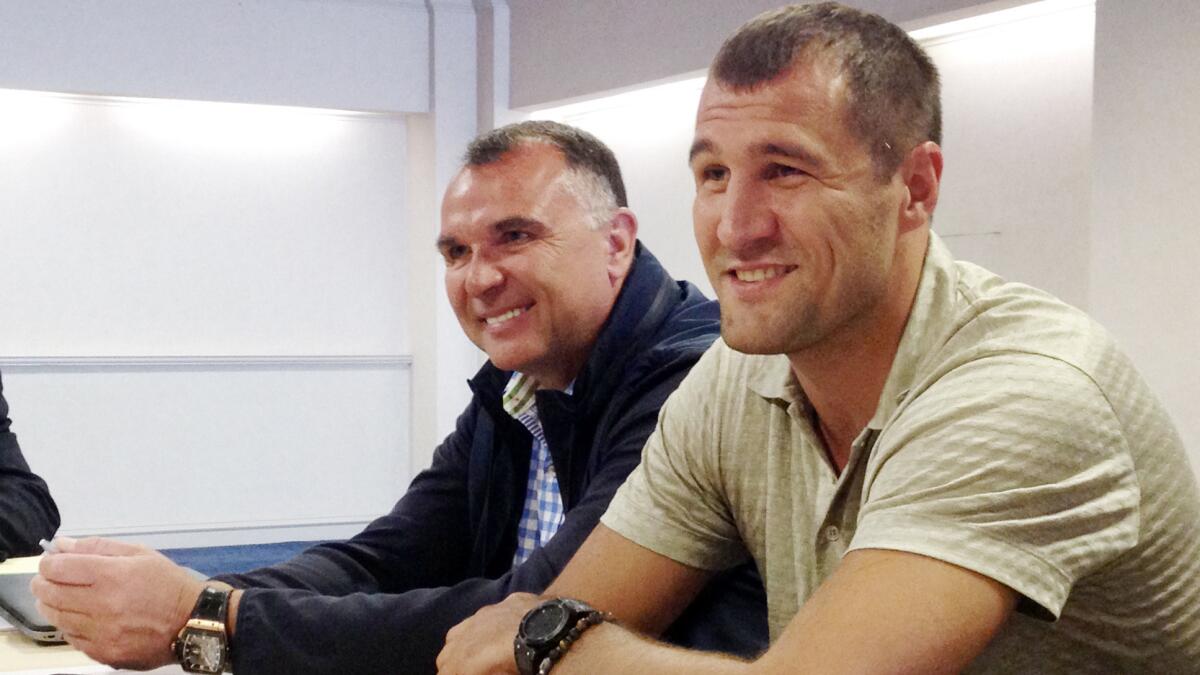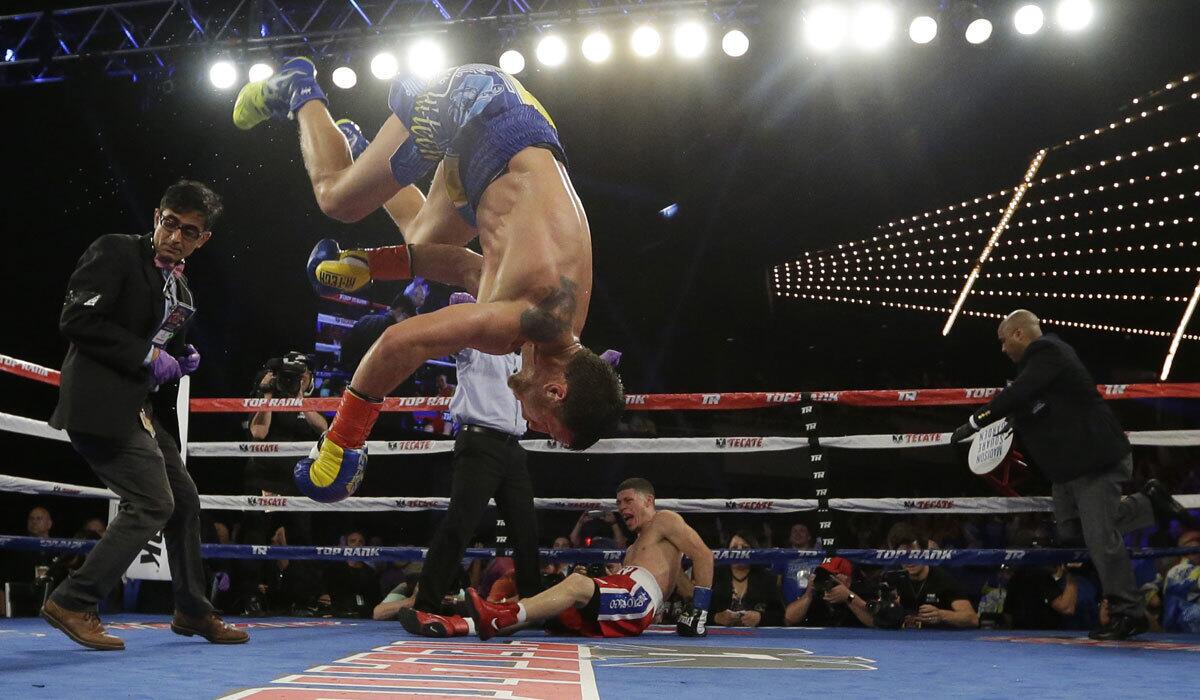A boxing manager thrives with talented fighters from Eastern Europe

- Share via
On consecutive weekends in November, boxing manager Egis Klimas will send his two prized fighters, Sergey Kovalev and Vasyl Lomachenko, to defend their world titles in Las Vegas.
“You ask how badly I want to see that? That’s like asking a blind man if he’d like to see,” Klimas said of Kovalev’s light-heavyweight event against unbeaten former super-middleweight champion Andre Ward on Nov. 19, and Lomachenko’s super-featherweight test versus Nicholas Walters on Nov. 26.
Last week, at the Oxnard gym operated by trainer Robert Garcia, Klimas spent his 52nd birthday visiting with his stable of Eastern European fighters who view him as a brother, friend and father.
While doing so, Klimas also recounted his remarkable journey.
A Lithuanian who dabbled in boxing in his teens, Klimas spent two years of military service in the Soviet Union, building garages to house defense rockets. “Around Moscow, there’s three rings of protection — rockets, tanks, bombs — and I worked in the second ring,” he said.
Klimas sought out of the tight Soviet grip, however, and after finishing his service, in 1989, he was approved by the International Rescue Committee to depart for Seattle. He arrived with $42, unable to speak much English.
“I walked into a Pizza Hut. Luckily, the owner was in the store at the time. All I said was, ‘Work. Job?’ I guess he understood this big guy was looking for work, so he took me in the back and showed me how to fold up and make pizza boxes,” Klimas said.
“I made those boxes as fast as I could. When the boss came back in, he said, ‘Whoa! OK, that’s enough boxes! Very good job.’ And he tucked a dollar bill in my pocket, a tip. I thought, ‘Wow, people appreciate what you do here.’”
From there, Klimas became a bait man on an Alaskan crab boat. His daily job — 20 hours a day for three months — was to grind up herring and shove the fish guts into plastic crab traps. “I wasn’t thinking about anything other than making a living and surviving then,” he said.
He returned to Washington with $15,000, enrolled in school, obtained a commercial driver’s license and began delivering pizzas at night and driving a delivery truck during the day.
All along, his boxing bug itched. He scraped together $800 to attend the 1992 Riddick Bowe-Evander Holyfield heavyweight title fight in Las Vegas, and he’d watch other big bouts on pay-per-view.
Meanwhile, a friend from Lithuania wired Klimas $60,000 and asked him to ship back American tennis shoes. He did and says he made $7,000 for two weeks’ work. A countryman from Seattle then asked him to join more expansive trading — refrigerators, televisions, even an Oregon sawmill that was disassembled and sent to Sakhalin Island in Russia.
The profits led Klimas to explore ventures in Eastern European currency exchange – and to form a company, Global Food Importers, which ships shrimp from Thailand to a major U.S. retailer.

Financially fortified, Klimas found himself at a 2001 fight where he spent extended time with Holyfield’s trainer, Don Turner, who asked him to call if he ever decided to represent any Eastern European fighters.
The seed was planted.
Klimas stopped by a Seattle gym and met an unbeaten Ukrainian, asking whether he’d like to train with Holyfield’s corner man. “Of course,” the fighter decided. “Can I bring a friend from Russia?”
So Turner schooled Klimas on the fight business, introducing him to trainer Teddy Atlas, promoter Kathy Duva and other boxing power brokers, and Klimas embraced his calling to mine Eastern Europe for boxing talent.
One Russian contact mentioned seeing an amateur who’d lost in a tournament in 2009. “His name is Sergey Kovalev,” the man said. “Give me his number,” Klimas answered.
“How ’bout turning pro?” Klimas asked Kovalev, inviting him to a meeting in Kazakhstan with Turner. Kovalev shadowboxed for two minutes in front of Turner, who turned to Klimas to say, “I’ve seen enough. Bring him to America. We’re going to make him a big champion.”
Klimas was honest with Kovalev: “Nobody knows you in America. You will not be a big fish. But I will support you all the way, get you a place to live, make some fights and get you a promoter. You must know: Russians are not popular in America and the light-heavyweight division is dead.”
Kovalev placed his trust in Klimas and recently as they drove to a news conference for the Ward bout, Kovalev remarked to Klimas, “I’m glad you believed in me. Look at where we’re at.”
Honesty again helped Klimas when he diligently pursued two-time Olympic champion Lomachenko and arranged sit-downs with American promoters, including Bob Arum.
Lomachenko wanted his first pro debut to be for a title. Arum told him he could make it happen in his second fight. Lomachenko accepted and told Klimas, “Now, Egis, I’ve seen enough; you are my manager. Make sure he delivers.”
Klimas has assembled a 13-fighter stable that features eight unbeatens.
The fighters either share a four-bedroom house in Oxnard or get their own apartment, keeping a close bond around the gym even as their home countries, like Russia and the Ukraine, are warring.
And while rival manager Al Haymon has a reputation for being overly protective of his fighters, Klimas struggles to convince others to make bouts against his Eastern European army.
“I’m not looking to take over boxing, and I’m not protecting anyone,” Klimas said. “My goal is to bring good fighters here, and I want them in the best fights. When my guys are in the ring, there’s action.
“You’ll see. [Kovalev and Lomachenko] are not my two best fighters. They are the best fighters in boxing.”
Twitter: @latimespugmire
More to Read
Go beyond the scoreboard
Get the latest on L.A.'s teams in the daily Sports Report newsletter.
You may occasionally receive promotional content from the Los Angeles Times.











